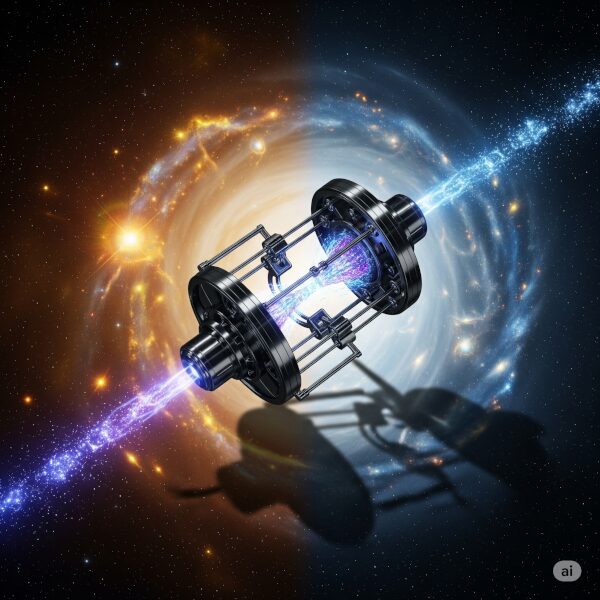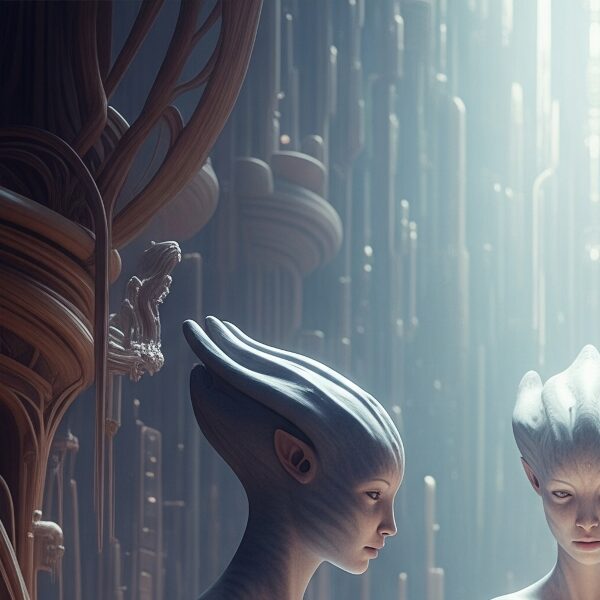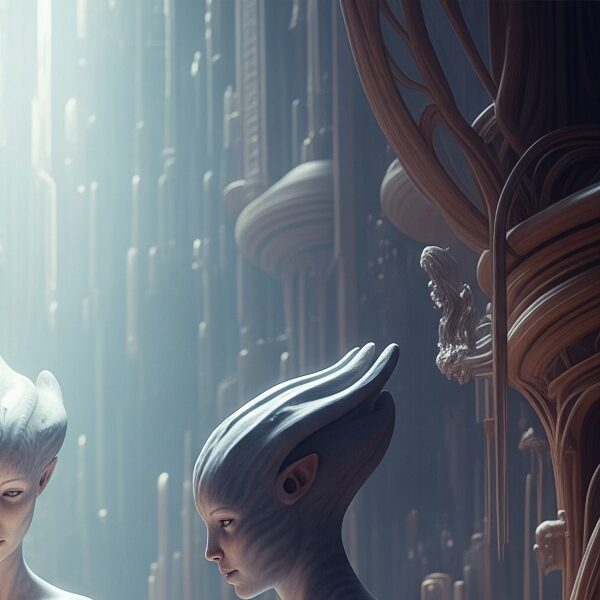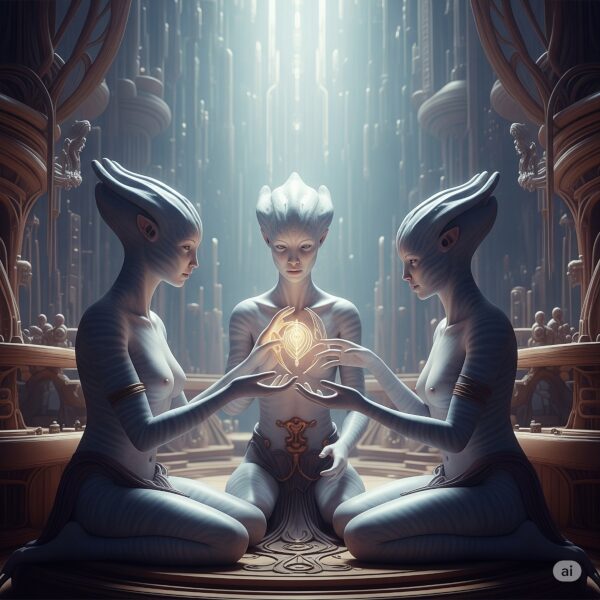No Soft-Ones, No Life.
Unveiling the Universe’s Grandest Tales
The Cosmos Calls: Why “The Gods Themselves” Still Shines
- The Cosmos Calls: Why “The Gods Themselves” Still Shines
- A Universe of Wonders: Unpacking the Genius of “The Gods Themselves”
- Beyond the Proton: Deep Diving into Asimov’s Existential Masterpiece
- Worlds Collide: “The Gods Themselves” and the Multiverse of SF Ideas
- Cosmic Wisdom, Daily Living: Lessons from Asimov’s Philosophic Tapestry
- Beyond the Page: Organisations Shaping the Future of Asimov’s Legacy
- Stargazing Ahead: Current Trends and AI’s Impact on the Future of SF
- A Curator’s Farewell: My Thoughts on Infinite Possibilities
As the intense summer sun casts long shadows across my garden here in Abiko, there are certain books that invite deeper reflection, and today, Isaac Asimov’s The Gods Themselves is one such companion. Originally published in 1972, this novel stands as a towering achievement in science fiction, a testament to Asimov’s unparalleled ability to weave complex scientific concepts into compelling human drama. It is a work that, even half a century later, continues to captivate and challenge our understanding of reality, existence, and the very laws governing our universe.
The Gods Themselves presents a chillingly plausible scenario involving parallel universes and the profound consequences of interdimensional energy transfer. Humanity discovers a method to exchange matter and energy with a ‘para-universe’, leading to what seems like an endless, clean energy source. Yet, the seemingly benevolent exchange soon reveals a catastrophic flaw, threatening the very fabric of both realities. This premise alone — a scientific solution leading to an existential threat — encapsulates Asimov’s genius for exploring the double-edged sword of progress. As a museum curator, I often reflect on how certain works, much like carefully preserved specimens of thought, offer insights into the prevailing scientific and societal anxieties of their time. The context of the Cold War, for instance, with its undercurrents of scientific competition and the looming threat of global annihilation, certainly provides a fascinating backdrop to Asimov’s narrative concerning unchecked scientific ambition.
A Universe of Wonders: Unpacking the Genius of “The Gods Themselves”
From my vantage point as a museum curator, The Gods Themselves is not merely a story; it’s a meticulously constructed intellectual exhibit, a thought experiment brought vividly to life. What makes this particular work so alluring is its masterful blending of hard science fiction with profound philosophical inquiry. Asimov, often celebrated for his “Three Laws of Robotics,” here turns his formidable intellect to physics, depicting a universe just slightly, yet significantly, different from our own.
The novel is famously divided into three parts, each told from a distinct perspective – Earth, the Para-Universe, and the Moon. This tripartite structure allows Asimov to explore the same overarching crisis through different cultural, scientific, and even biological lenses. The “soft ones” from the Para-Universe, with their unique tri-gendered reproductive system and vastly different societal structures, are perhaps the most captivating of Asimov’s creations. Their alien biology and psychology are meticulously detailed, inviting us to contemplate what ‘intelligence’ or ‘society’ truly means beyond our human-centric biases. It’s a testament to the power of science fiction to serve as a ‘thought specimen,’ allowing us to examine complex ideas from multiple angles, much like rotating an ancient artefact to appreciate all its facets.

Beyond the Proton: Deep Diving into Asimov’s Existential Masterpiece
The true brilliance of The Gods Themselves lies not just in its scientific rigor, but in its deep psychological and philosophical explorations. Asimov delves into the complexities of “otherness” and the inherent human tendency to project our own fears and desires onto the unknown. The novel forces us to confront uncomfortable questions about our own existence, our drive for progress, and the ethical implications of our scientific pursuits.
A compelling aspect is the profound contrast between human and para-human psychologies. While humans are driven by ambition and individual glory, the “soft ones” are portrayed with a fascinating, almost fluid sense of self. Their very being is tied to union and the formation of a collective “parent” — a biological and social structure so alien it highlights the “dilution of self” that might occur when individual identity is subsumed into a greater whole. Furthermore, the inverted sexual and social structures of the aliens, where the nurturing roles are uniquely distributed, serve as a poignant mirror, reflecting and challenging our own deeply ingrained societal norms. This stark dichotomy compels the introspective reader to consider the fundamental nature of identity and the sacrifices made in the pursuit of species survival versus individual fulfilment. It’s a chilling, yet beautiful, exploration of what it truly means to be a conscious entity in a vast, indifferent cosmos.

Worlds Collide: “The Gods Themselves” and the Multiverse of SF Ideas
The Gods Themselves is a quintessential example of “hard science fiction,” where scientific accuracy and plausibility are paramount. Yet, its themes resonate deeply across the broader science fiction landscape, particularly concerning the profound implications of “first contact” and the ethical quandaries posed by advanced technology. The novel’s exploration of parallel universes and the unintended consequences of interdimensional interaction invites comparison with other foundational works in the genre.
Consider, for instance, Ursula K. Le Guin’s The Left Hand of Darkness. While Asimov focuses on physics and shared survival, Le Guin masterfully explores gender and social structures through the lens of a non-binary alien society. Both novels challenge anthropocentrism, prompting readers to question the universality of their own societal constructs. Similarly, Ted Chiang’s Story of Your Life (the basis for the film Arrival) delves into the philosophical implications of alien language and the perception of time, echoing Asimov’s own deep dive into a physics paradox that could unravel realities. The common thread among these masterpieces, and indeed a core tenet of the ‘No-LIFE’ philosophy, is the emphasis on understanding complex relationships—be they interspecies, interpersonal, or interdimensional—and moving beyond human-centric biases to grasp a more expansive truth. These narratives compel us to recognise that true progress often lies not in conquering the unknown, but in responsibly comprehending our place within it.

Cosmic Wisdom, Daily Living: Lessons from Asimov’s Philosophic Tapestry
It might seem daunting to extract everyday wisdom from a novel about parallel universes and positron pumps. Yet, Asimov’s inherent scientific rationalism, when viewed through a philosophical lens, offers profound lessons for our daily lives. The concept of “ontology,” for instance — or put simply, how we understand what really exists — is implicitly explored in The Gods Themselves. The novel asks us to question our perceived reality, much as we might question our own ingrained assumptions in everyday decision-making.
Just as the characters grapple with unforeseen consequences of their scientific advancements, we too face a cascade of unintended outcomes from our seemingly small choices. Asimov’s narrative implicitly champions a kind of intellectual humility: the understanding that our current knowledge is always incomplete, and that every action has ripples we may not immediately perceive. This “scientific rationalism” can translate into a powerful tool for everyday decision-making: rather than reacting impulsively, we can learn to observe, hypothesise, test, and reflect. This deliberate process, much like a careful scientific experiment, allows for more thoughtful and ultimately more effective choices, leading us to a deeper understanding of ourselves and our place in the interconnected web of existence. It’s a quiet call to embrace intellectual curiosity, even when facing life’s perplexing paradoxes, reminding us that every challenge is an opportunity for profound discovery.
Beyond the Page: Organisations Shaping the Future of Asimov’s Legacy
The enduring impact of The Gods Themselves and Isaac Asimov’s broader literary legacy is sustained by numerous organisations and initiatives. These entities play crucial roles in preserving, promoting, and expanding the reach of his extraordinary vision:
- Isaac Asimov Estate: Manages his extensive literary output, ensuring his works remain in print and his intellectual property is protected.
- MIT Press: Frequently publishes academic works and critical analyses related to science fiction, often engaging with the scientific and philosophical concepts Asimov introduced.
- Science Fiction and Fantasy Writers of America (SFWA): Asimov was a prominent member, and organisations like SFWA continue to champion the genre and support writers who follow in his footsteps.
- NASA & Space Agencies: While not directly “related” in a corporate sense, their ongoing scientific and exploratory missions often mirror the grand scientific ambitions and ethical dilemmas explored in Asimov’s works, especially concerning alien contact and the pursuit of energy. Their research in areas like fusion power or exoplanet discovery continually brings Asimov’s fictional concepts closer to reality.

Stargazing Ahead: Current Trends and AI’s Impact on the Future of SF
The science fiction landscape today is as vibrant and ever-evolving as the universe itself, with new technological frontiers constantly reshaping what’s possible in storytelling. The Gods Themselves, a cornerstone of hard SF, remains remarkably relevant in the face of these developments.
For instance, the rise of AI-driven SF plot generation is a fascinating, if sometimes disquieting, development. One might wonder, what would Asimov, the grand master of logical narratives and positronic brains, have made of algorithms attempting to craft the very stories he perfected? Would he have seen it as the ultimate evolution of his own logical thinking, or a rather crude imitation? Similarly, the rapid advancements in quantum computing and parallel universe hypotheses give new scientific weight to the core premise of The Gods Themselves. What was once theoretical now flirts with the realm of the plausible, making Asimov’s “para-universe” seem less like pure fantasy and more like a potential scientific frontier. And of course, the ever-present debate around AI ethics continues to echo themes he explored for decades. How we define intelligence, responsibility, and consciousness in artificial beings – questions Asimov pioneered – are now at the forefront of global conversations. One can almost hear him, with a wry smile, musing on humanity’s perpetual struggle to catch up with its own creations.
A Curator’s Farewell: My Thoughts on Infinite Possibilities
In closing, The Gods Themselves is more than just a brilliant piece of science fiction; it’s a profound meditation on humanity’s place in the cosmos, our relentless pursuit of knowledge, and the unforeseen consequences that often accompany our greatest triumphs. It reminds us that even when facing seemingly insurmountable obstacles, there is always a path forward, often requiring courage, collaboration, and a willingness to look beyond our immediate confines.
This is my personal reflection, of course. As a curator, I find myself drawn to works that not only entertain but also provoke genuine introspection. Asimov’s ability to combine rigorous scientific speculation with deeply human dilemmas is, to my mind, truly masterful. He beckons us to consider not just what we might achieve, but why we pursue it, and at what cost. So, as you gaze up at the vast expanse tonight, perhaps, looking up at the stars will feel a little different after this. What kind of future would you choose if the laws of physics no longer held you back?
The Gods Themselves by Isaac Asimov
Related Articles
-
SF Novel Masterpiece Collection: A Timeless Journey – Doomsday Book by Connie Willis

Doomsday Book: No History, No Life. Connie Willis’s award-winning novel masterfully blends time travel, medieval plague, and emotional human truths.
-
Understanding Time: Why Michael Ende’s Momo Is a Must-Read!

Understanding Time: Explore Michael Ende’s ‘Momo’ to rediscover the true essence of time, the power of listening, and the fight against the insidious Grey Gentlemen. Reclaim your moments.





Leave a Reply